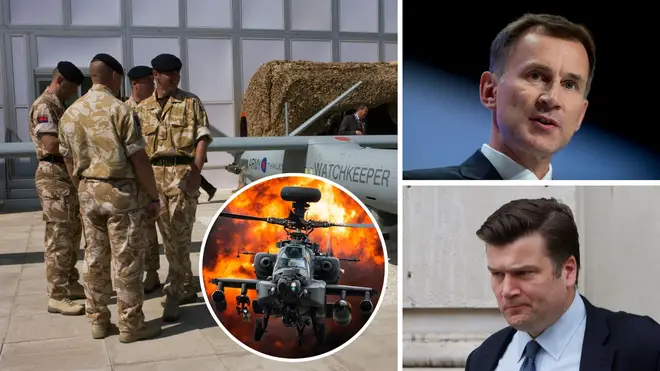
Tom Swarbrick 4pm - 6pm
18 April 2024, 01:30 | Updated: 18 April 2024, 06:28

Jeremy Hunt has admitted that Britain needs to increase defence spending – but no extra cash is set to be given before the general election.
Mr Hunt said the UK, along with other European allies, must take more responsibility for their own security amid growing tensions with Russia and Iran.
He added that former president Donald Trump was right to call for Europe to increase its defence spending.
"It’s very important that European countries recognise that, when it comes to America’s role in the world, we are actors, not observers," the Chancellor said.
"In the end, we have to be prepared to spend more on defence. That is a reasonable request from the United States that Europe contributes more to its own defence."
Mr Hunt previously said he would increase defence spending to 2.5 per cent of GDP once it is affordable to do so.
But the government is facing growing calls to speed up its cash injection into the military.

Has Britain 'failed to prepare itself for war'?
Former Armed Forces minister James Heappey hit out at the lack of action on Wednesday evening, after it was revealed that there would be no increase in defence spending before the general election.
It came after Mr Heappey submitted a written parliamentary question asking when the increase would happen.
Chief Secretary to the Treasury Laura Trott responded saying the path to 2.5 per cent "will be set out at the next Spending Review".
But a Spending Review is not due to take place this year, suggesting increases will not be made until the next Parliament.
"The government’s aspiration is to invest 2.5% of GDP on defence, when the fiscal and economic circumstances allow," Ms Trott said.
"The Prime Minister has been clear that the target and path towards 2.5% will be set out at the next Spending Review.
"The government has consistently prioritised defence spending.
"The Ministry of Defence was the first department to get certainty on its budgets in this Parliament.
"This settlement was the largest sustained spending increase in defence since the end of the Cold War, with a £24 billion uplift in cash terms over the four-year period.
"In March 2023, we also provided an extra £11 billion for defence and national security priorities over the next five years, with £4.95 billion over the next two years."

Nick Ferrari speaks to Laura Trott: Watch again
In response, Mr Heappey said he was "hugely disappointed".
"It treats an increase in defence funding as just another routine government spending decision which can wait until a post-election spending review," he added, according to the Mail.
"It is as if Treasury mandarins are not watching the news or reading their intelligence reports. The world is getting more dangerous, our brave armed forces are ever busier, and yet the Treasury simply won't bother to engage until next year."
Other former defence ministers have also been critical over the lack of investment.
Mark Francois said: "The parallels with the 1930s, when our then Chancellor, Neville Chamberlain, persistently resisted increasing defence spending are becoming starker by the day.
"With Russian tank factories working around the clock, someone needs to send HM Treasury a copy of Winston Churchill's history of the Second World War - and explain to them what happens if you don't maintain strong defence spending."
Ex-defence secretary Ben Wallace previously tweeted: "Nearly every Nato country has increased defence spending since the invasion of Ukraine. We haven't."